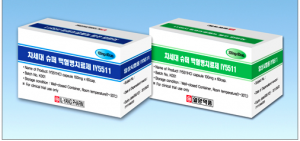Radotinib approved in South Korea for CML

The Yonhap news agency announced today that the South Korean equivalent of the FDA had approved Il-Yang pharmaceuticals radotinib (brand name Supect) for chronic myeloid leukemia (CML). Radotinib is a tyrosine kinase inhibitor, also known by its development code of IY5511.
I briefly mentioned radotinib in my CML update from the ASH 2011 annual meeting.
The Yonhap release quotes an official at the Korean Centers for Disease Control and Prevention (KCDC) as saying that:
“It will be used on patients who have become resistant to existing drugs such as Gleevec, Tasigna and Sprycel.”
While its use in Korea appears to be in second or third line & non-responding patients, the Yonhap release states that “Il-Yang have started additional clinical trials in South Korea, India, Thailand and Indonesia,” and the intention in those countries appears to be directed to front line use.
No mention is made of China or Brazil, but the fact that Il-Yang are focusing on the emerging markets of Asia, does not rule out that this drug might finder wider use outside of the countries where clinical trials have taken place. I could certainly see generic companies interested in potential licensing opportunities.
Details of the price of Supect (not a name I particularly like, I have to say – suggests “Suspect” but I am sure the name translates better in other languages) are unknown. Il-Yang are quoted in the Yonhap release as saying that it will be priced cheaper than existing CML drugs.
Could Supect be a competitor to Ariad’s ponatinib? I am sure there will be more information released as to which mutations it targets, but it’s a product that has largely flown under the radar. I have not seen any presentations at recent EHA or ASH annual meetings. Even if it is more closer to imatinib than ponatinib in terms of efficacy, its launch may have an impact on the future ponatinib pricing strategy.
Will Novartis and BMS compete on price in Korea and other Asian markets? It will be interesting to watch whether they see Supect as serious competition. With the prospect of generic imatinib in a few years time, radotinib may have just made it to market in time.